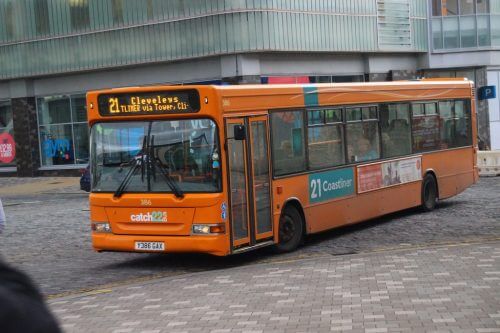
Upper Tribunal rules result of previous PI still stands – O-licence to be revoked on February 18. However, judge-led inquiry into conduct of the former STC remains on-track
Blackpool-based independent operator Catch22Bus has lost its appeal in the Upper Tribunal against having its O-licence revoked – and the firm’s Managing Director Philip Higgs is set to be disqualified.
In the decision announced on December 4 following an oral hearing of the appeal held at Field House, London on September 5, H. Levenson, Judge of the Upper Tribunal stated: “We confirm the decisions of the Traffic Commissioner (TC) given on November 18, 2016 in respect of PSV Operator’s Licence PC1067540 following a Public Inquiry (PI) held in London on November 7, 2016. Accordingly, the above licence held by the first appellant (Catch 22 Bus Limited) is revoked and the second appellant (Mr Higgs) is disqualified for 12 months from holding or obtaining a PSV O-licence. The orders made by the TC were originally to take effect from January 18, 2017, but subsequently the TC stayed the implementation of his orders pending our decision. We now direct that they are to take effect from 0001hrs on February 18, 2018. This will enable appropriate arrangements to be made.”
As previously reported in CBW, Philip had instructed a private investigator, who for three days had followed the then Senior Traffic Commissioner (STC) Beverly Bell and filmed her driving her personal vehicle. Under an assumed name, he had posted video footage on video-sharing website YouTube with captions alleging that during the course of her own driving, the STC had turned left against a red light and had travelled at excessive speed along two separate motorways. The commentary effectively accused her of hypocrisy because in her professional occupation she exhorted licence holders to comply with road traffic legislation.
Notably however, the Upper Tribunal found the TC at the PI had: “Over-relied on what he regarded as negative aspects. The surveillance was lawful (we observe that this was not the case if it actually amounted to harassment), the filming was not a serious invasion of privacy – it was undertaken at a distance in public places and showed nothing which arose from inherently private or confidential circumstances; it was akin to insurance investigators checking on claimants. There was no evidence of the considerable upset and distress said to have been caused to the STC, except in the summary of the police interview. The anonymity of his posting followed the general practice on YouTube and surely emphasised that he had no wish to influence the STC in his own personal case.
“We add that references to breach or invasion of privacy can be taken in a general sense and need not refer to the establishment of a tort. There can be no rational argument that the conduct was not connected to the regulatory regime and the operation of the licence.”
The Upper Tribunal concluded: “The admitted conduct in the present case was a direct attack on the very essence of an independent adjudicatory process. It was directed at the STC because of her official position and function. In our view the sanctions imposed by the TC were the very least that could reasonably be imposed in the circumstances of this case. This appeal does not succeed.”
Reacting to the decision, Philip told CBW: “We are obviously disappointed in the Tribunal’s decision, but are not surprised because it considered no new information that has come to light even since the appeal hearing. It seems absurd that a finding could be made that we are unlikely to comply with the operating regime when it has been shown that we have always complied.
“Since the November 2016 decision, DVSA has admitted to making ‘genuine errors’ in assessing our compliance and the Department for Transport has agreed to hold a judge-led inquiry into the conduct of the former STC.
“Based on the DVSA admission, we should never have been called to PI in the first place and we are lodging an application to stay the decision to the Court of Appeal. The case well and truly continues….”
On that note, he also told CBW: “Following a complaint to the Information Commissioner’s Office (ICO), we have been informed that ‘it does appear that DVSA might have redacted more information than is reasonable. In particular, I note a couple of examples where information has been redacted from your own correspondence, which is not likely to be reasonable.’
The ICO added that ‘Based only on the information you provided to us it does appear that DVSA might have breached the Data Protection Act. We have provided DVSA with some advice on how to improve its information rights practice in relation to this particular concern. We have also asked it to review the redacted information with a view to providing you with any further information to which you are entitled, within 20 working days.’
“The ICO’s response follows a complaint to them by Catch22Bus after the DVSA redacted over 85% of material within 82 pages of documentation following a request for information they hold in connection with our operation between 2012 and 2015. We are also still awaiting a response to a similar Subject Access Request disclosure from the TCs which should have been supplied by November 1. The disclosure is still awaited and the ICO has been informed.”

